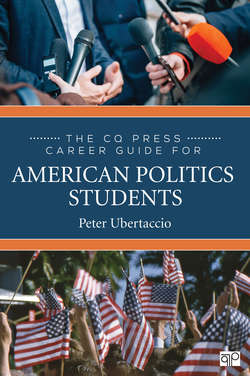Читать книгу The CQ Press Career Guide for American Politics Students - Peter Ubertaccio - Страница 6
На сайте Литреса книга снята с продажи.
ОглавлениеPreface
Introduction
The best part of being a professor at a college dedicated to a core liberal arts curriculum is the opportunity it affords to teach and learn both in and out of the classroom. What I have noticed over the years, however, is a growing disconnect between the activities in my classroom and the kinds of questions and concerns students have about the job market or next steps they might take upon graduation. It was as if the study of politics was somehow unrelated to the demands of an ever-changing job market.
The response to this trend is the guide. The data from employers and their own observations of the job market make it clear they want students who have strong analytical and critical thinking skills, public-speaking and writing skills, and the ability to process complex issues and data points. They want creative thinkers who can work in teams, who are capable of research, and who understand the world in which we live. These are the skills one develops by a rigorous study of politics.
I imagine this guide as a companion piece along with an introductory or upper-level textbook in courses in American politics. It aims to be a powerful introduction to the job market in the field and to the variety of options that exist for the student who is interested in and passionate about politics. Many students, those who major in political science and those who simply have a passing interest in the subject, wish to learn more about career paths in the field. It is particularly difficult for them to navigate job opportunities in the field because the market is diffuse and open to so many pathways.
Making that first step is difficult. Indeed, launching a career in politics can be frustrating because of the peculiarities of this particular job market. There’s not going to be a table at job fair that reads, “American Politics.”
This book is designed to help alleviate some of the frustrations undergraduate students encounter by encouraging them to take the important first few steps into this world with a full understanding of how to develop a trajectory in politics and government that can yield important results later in their careers.
Plan of the Book
My hope is this guide will appeal to any student with an interest in the subject. Students find themselves in courses in this field because of their interest in politics, government, campaigns and elections, and current events. Very few choose to go directly into a Ph.D. program. Indeed, interim steps between undergraduate work and graduate school are often a requirement for some of the best Ph.D. programs in the field.
The book begins by encouraging students to think about their own stories and the problems in this world they hope to solve. It encourages them to think about this before worrying about an older question, “What do you want to be?” Students redirected away from this narrow question are much better prepared for many other questions this book will help them consider, for example:
What can you do with your interest?
How can you leverage your interests and academic work for employment after college?
What steps should you be taking now to ensure your professional readiness after graduation?
Chapter 1 begins the process of examining each of these questions, designed to help students with an interest in politics align their academic and co-curricular pursuits to skills and career readiness competencies that are in demand by employers in the field. It lays out an important checklist that students can use to begin this process, including resume review, a social media strategy, and what networking really means.
Chapter 2 focuses on helping students align their interests with the appropriate coursework, internships, work experience, and co-curricular opportunities, while Chapter 3 looks specifically at entry-level staff work and offers guidance on how to navigate this space. Chapter 4 looks at campaign work for candidates, parties, and issues. Chapter 5 discusses the variety of other pursuits open to the student of politics, from graduate school to professional school to nonprofit work, education, think tanks, and more.
